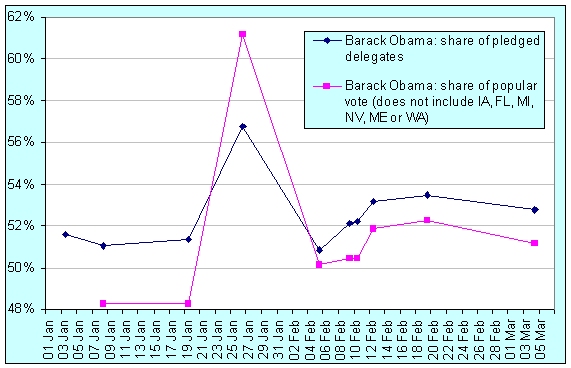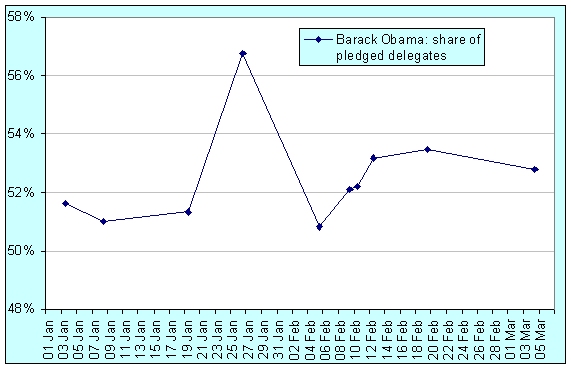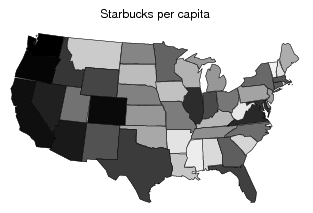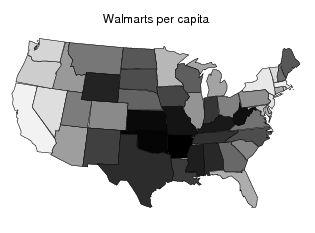Taking the data from Real Clear Politics today (14 March), here is an update of how Obama and Clinton have been going in running totals of pledged delegates:
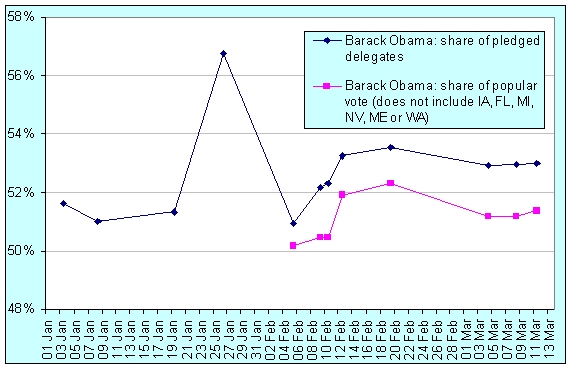
As always, when calculating the percentages in the centre column, I’m ignoring pledged delegates that are too close to call and those with John Edwards.
| Date | Barack Obama: running total | Barack Obama: share of pledged delegates | Hillary Clinton: running total |
| 3 Jan (IA) | 16 | 51.6% | 15 |
| 8 Jan (NH) | 25 | 51.0% | 24 |
| 19 Jan (NV) | 38 | 51.4% | 36 |
| 26 Jan (SC) | 63 | 56.8% | 48 |
| 5 Feb (Super Tuesday) | 913 | 50.9% | 879 |
| 9 Feb (LA, NE, WA, Virgin Is.) | 1019 | 52.2% | 934 |
| 10 Feb (ME) | 1034 | 52.3% | 943 |
| 12 Feb (DC, MD, VA, Dem.s Abroad) | 1144 | 53.3% | 1004 |
| 19 Feb (HI, WI) | 1200 | 53.5% | 1041 |
| 04 Mar (OH, RI, TX, VT) | 1380 | 52.9% | 1227 |
| 08 Mar (WY) | 1387 | 53.0% | 1232 |
| 11 Mar (MS) | 1406 | 53.0% | 1246 |
There are now 566 pledged delegates to fight for (assuming that Florida and Michigan don’t get redone), 26 with John Edwards and 9 that have been voted on but are still too close to call.
The gap in pledged delegates between the candidates is now 160.
I assume that the 35 delegates that are with Edwards or too close to call will be split 50-50 between Obama and Clinton. I actually believe that Obama will get more than half of them (22 of Edwards’ delegates came from states where Obama won) but let’s be generous and say that 18 go to Clinton and 17 to Obama.
That means that Clinton needs to close a gap of 159 with only 566 pledged delegates to come. She needs to win 363 or 64%. To stay in front, Obama only needs to win 204 or 36%.
If Florida and Michigan are redone, then we have 879 delegates to come, from which Clinton would need to win 519 or 59%. To stay in front, Obama would only need to win 361 or 41%. Given its large population of Hispanics, it seems clear that Clinton would do well in Florida, so it’s pretty obvious why she wants these two states back in play.
But is it plausible to think that she can win among pledged delegates? No, not really; not even if Florida and Michigan do get redone.
On the basis of pledged delegates, Clinton has only won 13 out of 46 contests so far. On the basis of popular vote, she has won 14 out of 40; 16 if you include Florida and Michigan (Iowa, Maine, Nevada and Washington haven’t released their popular vote counts).
In those states she won in pledged delegates, Clinton has averaged 57% of the delegates on offer: she got 688 to Obama’s 517.
So in order to win overall among pledged delegates, Clinton needs to win all 12 (if FL and MI are included) remaining contests and do better in every one of them than she has previously in her winning states. If she loses any of them, then she’ll need to absolutely blow Obama out of the water in the rest. I just can’t see this happening.
